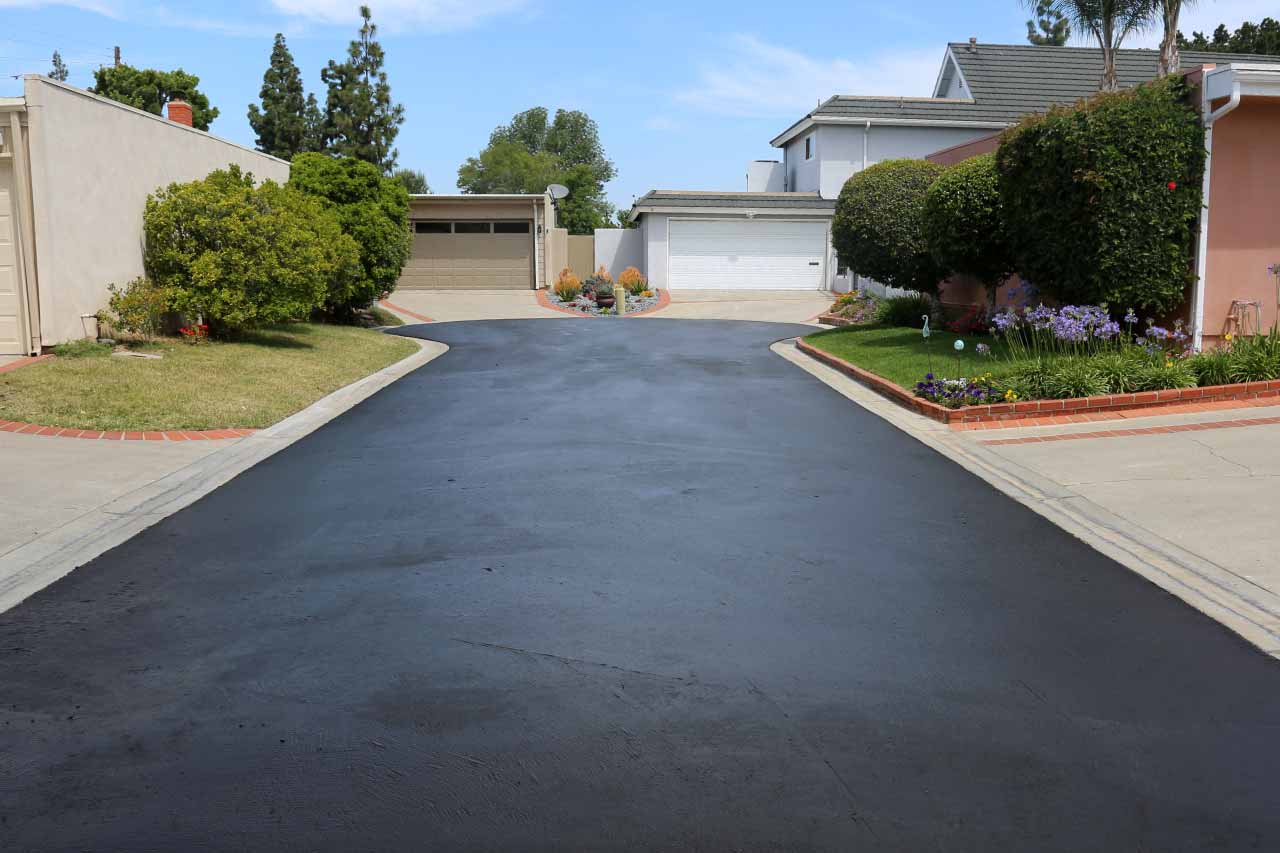
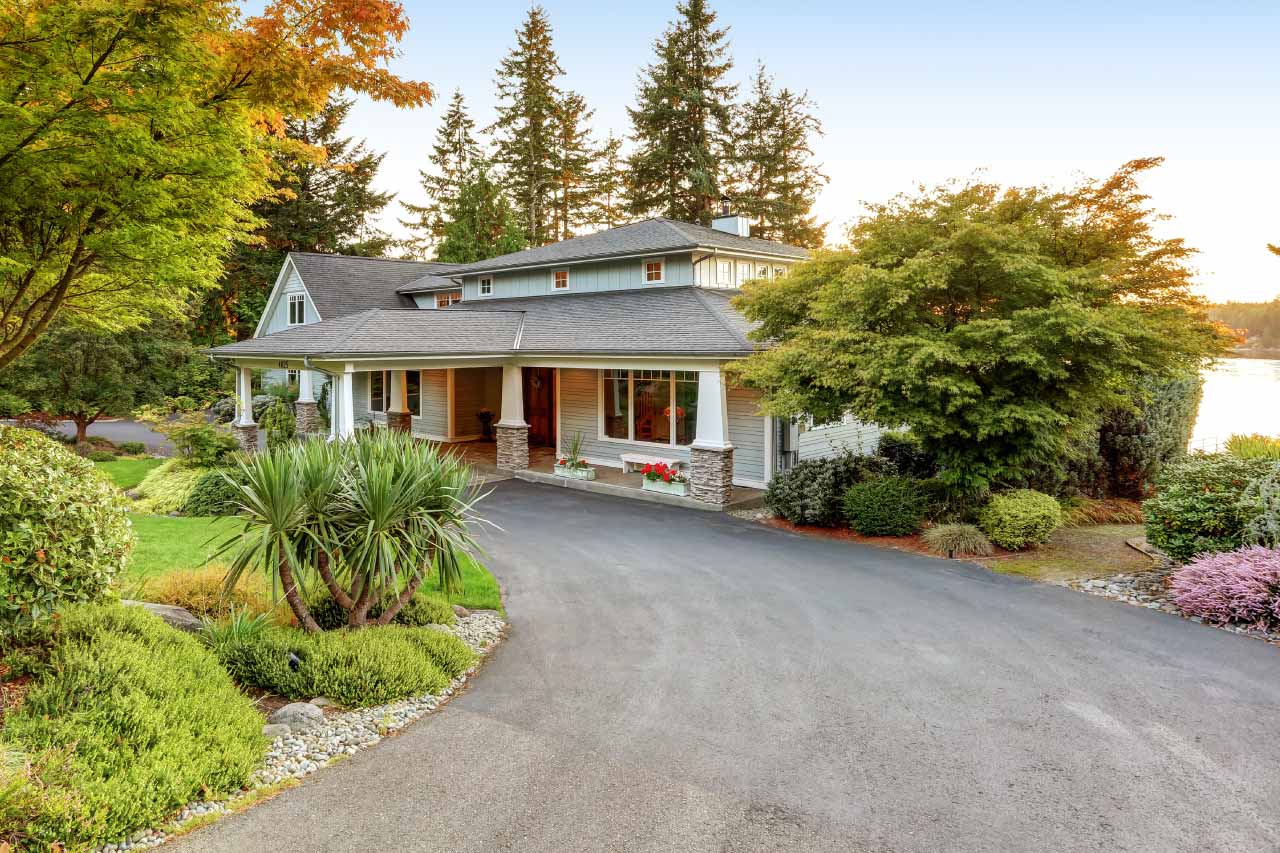
Left/Top: Photo: Iriana Shiyan / Adobe Stock
Bottom/Right: Photo: mike ledray / Adobe Stock
Asphalt versus concrete in a driveway almost always comes down to what’s most common in your neighborhood. But if that’s not a concern, you’ll choose between concrete or asphalt driveways based on cost and durability. For similar-sized driveways, you’ll spend about 50% more on concrete than asphalt, but it’ll last about twice as long—about 50 years or more with repairs.
Concrete and asphalt are both mixtures of sand and crushed stone called aggregate. The difference is what binds the aggregate together. In concrete, cement binds the mixture and gives it a light gray appearance. In asphalt, a black, viscous petroleum-based substance called bitumen binds the material together. Both come in assorted colors and can be stained or stamped for a decorative effect.
On This Page:
- What Is Asphalt?
- What Is Concrete?
- Appearance
- Cost
- Upkeep
- Durability
- Installation
- Life Span
- Environmental Impact
- Resale Value
- Which Is Better for Your Home?
- Asphalt and Concrete vs. Other Options
What Is Asphalt?
Asphalt driveways are actually asphalt concrete. Asphalt, also known as bitumen, is the black semi-liquid that binds together an aggregate, like crushed rock and old concrete. It’s a petroleum by-product used mostly in road construction, driveways, and roofing. However, when you hear “asphalt driveway,” it’s typically referring to the final mixture that makes a hard, durable surface to park your car on.
What Is Concrete?
Concrete in construction is a mixture of cement and aggregate, typically recycled concrete or crushed rock. Cement acts as the binder when combined with water, resulting in a hard, durable surface, much like asphalt. However, concrete is far more durable. Pros pour the cold mixture onto a prepared gravel surface and level it. After several days of curing, the surface is ready to support the weight of vehicles.
Appearance
Concrete wins for versatility in appearance with a variety of finishing techniques available. Asphalt comes as a black, smooth surface, while concrete is a gray surface that’s typically slightly textured for grip.
| Asphalt | Concrete |
|---|---|
| Black and smooth | Typically gray in color |
| Can be sealed with varying colors | Can be stamped into patterns or to mimic stone or brick |
| Can be stamped to look like brick | Can be stained with many color options and patterns |
| Tinting is available using naturally colored rocks, iron, slag, or even recycled glass | Colors can look blotchy due to natural variations in aggregate |
| Round edges don’t work with decorative pavers | Stamping and coloring increase the price |
Asphalt
Since asphalt is naturally black, you have limited color options—and only if you decide to seal it completely, which isn’t typical when initially installing it. With asphalt, you can also stamp it to mimic the look of brick or stone.
Concrete
With concrete, you get far more options for appearance. You’ll be able to choose the color, staining, and patterns. These are all extra upgrades that’ll add to the overall cost, but they generally increase the curb appeal of your home and pair well with landscaping upgrades. Unlike asphalt, you’ll also get spalling over time, which is the top surface coming off, and you might need to pay to resurface it.
Cost
When comparing asphalt versus concrete driveway costs, asphalt wins. Driveway installation costs $2,500 to $7,000 on average, and with prices steadily rising, you can expect to pay on the higher end of that range. Actual costs will be higher for most concrete installs; recycled asphalt tends to be a bit less expensive, but asphalt prices fluctuate more with the price of petroleum.
| Asphalt | Concrete |
|---|---|
| $5 – $15 per square foot | $8 – $18 per square foot |
| Basic installs cost about half as much as concrete | Increased prices for stamped and stained concrete |
Asphalt
Asphalt driveways cost about $3 per square foot less than a concrete driveway of the same size. Homeowners sometimes install asphalt driveways when a longer driveway is needed to help cut the cost down. You can also opt for a crushed asphalt drive, which is even less expensive and falls somewhere between the cost of a gravel and paved driveway.
Actual costs vary depending on the season and location, so contact a local asphalt installer for exact prices in your area.
Concrete
Concrete driveways cost $2,000 to $10,000 or more, depending mainly on the size, but any upgrades you might want to consider will also drive up the cost. You’ll spend more for stamped concrete and slightly more for a stained concrete driveway.
On average, you’ll spend $7 to $15 per square foot on concrete staining costs and $10 to $28 per square foot on concrete stamping costs.
Upkeep
Concrete wins for upkeep because it requires less maintenance over time. It degrades slower than asphalt; even when it does crack or spall, it’s usually only cosmetic. With asphalt, a small crack can quickly worsen.
For both asphalt pavement and concrete, repairing a crack requires simply filling it with off-the-shelf sealers, which you can buy at most home improvement stores and do yourself. Driveway crack repair and sealing costs and applications vary a bit depending on which one you go with.
| Asphalt | Concrete |
|---|---|
| Seal cracks | Seal cracks |
| Requires topcoat sealant after 6 months | No sealant required |
| Reseal every 4 years on average | Can seal, but not required |
Asphalt
Asphalt requires more upkeep than concrete. To keep asphalt looking as good as its concrete counterpart, you’ll want to seal it regularly. Consider repairing cracks as soon as possible to keep them from getting worse. You’ll also extend the life span of your driveway from about 15 years to 30 years if you reseal it every few years.
Asphalt resealing costs $275 to $800 and involves coating the surface, providing a seal against both climate and chemicals. Unlike concrete, you’ll want to do this after six months and every three to five years after that. Asphalt driveway repair costs $1,000 to $3,800, but asphalt tends to be slightly easier to repair than concrete, thanks to small patch repair kits.
Concrete
Concrete driveways require less upkeep and maintenance than asphalt, although regular cleaning and crack repair can extend the life span of the slab. Concrete resurfacing costs $3 to $5 per square foot.
Start Your Driveway Project TodayDurability
This is where concrete shines. It’s far more durable than asphalt and lasts about twice as long. Both are great options for a driveway, but your climate and budget might play more of a role in this. In cold, northern climates prone to freezing temperatures, asphalt might be the better solution.
| Asphalt | Concrete |
|---|---|
| Less durable than concrete | The most durable driveway surface |
| Works better in northern climates | Works better in southern and moderate climates |
| Can expand and contract with freeze-thaw cycles | Stands up better to freezing temperatures |
Asphalt
Asphalt isn’t as durable as concrete. However, it’s suitable for northern climates because it can expand and contract, making it more resistant to freezing and thawing cycles in cold, icy areas.
Concrete
Concrete wins overall in durability for driveways in most areas. Even slight cracking and spalling don’t harm its ability to carry the weight of your car. It’s the most durable surface you can use for a driveway.
Installation
Asphalt is easier to install than concrete. Both go in quickly with a pro, although asphalt is ready to put your car on sooner. It’s possible to install concrete yourself, although it’s incredibly easy to do it incorrectly, so hiring a local concrete driveway installer is almost always recommended. If done incorrectly, you’ll have to pay extra for the removal of the old concrete before a replacement can begin.
| Asphalt | Concrete |
|---|---|
| Requires heavy machinery to compact it correctly | Only requires hand tools if you have the concrete delivered and poured |
| Ready to use in a day | Takes several days to harden |
| Not DIY-friendly | You can do it yourself with the proper tools and experience |
Asphalt
Asphalt installs quickly and cures faster but requires specialized equipment, making it harder to DIY than concrete. The labor costs for installing asphalt are slightly less expensive than concrete.
Concrete
Concrete takes a few extra days to cure but doesn’t require a lot of specialized equipment. Most of the total price comes from the labor to install it if you hire a concrete contractor. It is possible to DIY if you have experience and knowledge on how to do it properly.
Life Span
Concrete lasts twice as long as asphalt, making it the clear winner for life span. Opt for concrete if you want a one-and-done solution that you’ll probably never have to redo.
| Asphalt | Concrete |
|---|---|
| 20 – 30 years | 40 – 50 years |
| Requires resealing to maximize the life span | No upkeep required to maximize the life span |
Asphalt
With proper sealing every three to five years, asphalt will last 20 to 30 years. It performs better than concrete in northern climates with freeze-and-thaw cycles, but this shortens its life span.
Concrete
Concrete lasts about 50 years with no special treatment, making it one of the best driveway materials. You can get extra life out of it by sealing cracks and eventually resurfacing them. You can also seal concrete to harden it and lessen the effects of stains.
Environmental Impact
Asphalt narrowly wins for environmental impact for northern states, while concrete makes a much better solution in southern states. Although it’s a petroleum-based product, it is easier to create and use and is 100% recyclable. However, concrete lasts far longer, and most of it is recyclable. For every concrete driveway installed, you’ll install or redo at least two made from asphalt.
| Asphalt | Concrete |
|---|---|
| Asphalt | Concrete |
| Petroleum-based product | Mineral- and rock-based product |
| Heavy production and transportation impacts | Heavy production impact |
| 100% recyclable | Mostly recyclable |
Asphalt
Since it’s a petroleum-based product, asphalt has a higher embodied energy cost, which is the energy used to mine, refine, package, ship, and install it. However, asphalt is 100% recyclable, meaning there is no waste once you replace your driveway. However, it softens and needs more repairs in hot climates, negating any advantage it has over concrete.
Concrete
Concrete is made from aggregates with a cement binder and has a high resource cost to bring it to market. The embodied energy cost negates the fact that it’s not a petroleum-based product. However, since it is mostly recyclable and lasts twice as long as asphalt, it’s often a better choice.
Find a Local Driveway ProResale Value
There is no clear winner for resale value. Both asphalt and concrete depend heavily on the area in which you live. In any area, opt for the material most often used in your neighborhood. If there is no clear winner, ask a realtor if one would be better for ROI. Often, you can increase your home’s curb appeal with stained and stamped concrete, which is much easier than with asphalt.
| Asphalt | Concrete |
|---|---|
| Not as versatile for exterior landscaping upgrades | Can increase curb appeal with stamped and colored concrete |
| Doesn’t noticeably increase value over concrete | Doesn’t noticeably increase value over asphalt |
Is an Asphalt or Concrete Driveway Better for Your Home?
Whether an asphalt or concrete driveway is better for your home depends on your budget, your climate, and whether you’re looking for a stamped and stained landscaping upgrade. Concrete holds up better over time and requires less maintenance, but both asphalt and concrete suffer from cracking and staining.
| Asphalt Driveway | Concrete Driveway | |
|---|---|---|
| Asphalt Driveway | Concrete Driveway | |
| Cost | About half the price of concrete | About twice the price of asphalt |
| Climate | Best for cold, northern climates with freeze-thaw cycles | Best for hotter climates where asphalt will soften and degrade |
| Maintenance and Repairs | Requires resealing six months after installation and then every three to five years | Sealing isn’t required but doing so every five years can prolong its life |
| Longevity | 15 – 30 years | 35 – 50 years |
| Aesthetic Appeal | Not as easy to personalize | Easier to stamp, score, color, or stain |
| Drying Time | You can drive on it immediately | Needs to cure for a few days to a week |
Asphalt and Concrete Driveway vs. Other Options
Although asphalt and concrete driveways present the vast majority of driveway paving options, there are a few other materials to choose from, including gravel and permeable pavers.
Gravel
Gravel driveways cost $1 to $2 per square foot, making them incredibly cost-efficient to install, but they also need upkeep and can often reduce the curb appeal of your home.
Permeable Pavers
Permeable paved driveways cost $10 to $40 per square foot, making them a higher-end option, mostly due to the time-intensive installation process. However, they add a unique aspect to your home that may increase its value.
Brick Pavers
A paver driveway costs $10 to $50 per square foot, making it one of the most expensive options. But, like permeable pavers, it offers a luxurious look to the outside of your home.
Need a Pro for Your Driveway Project?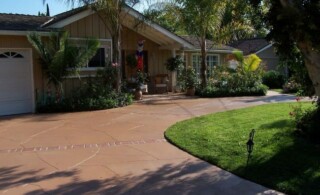 About Heated Driveways
About Heated Driveways 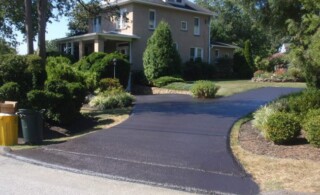 Driveway Sealing Facts
Driveway Sealing Facts 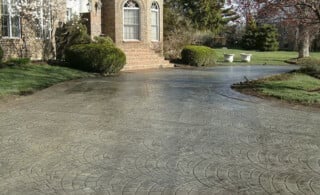 Pouring a Concrete Driveway or Walkway
Pouring a Concrete Driveway or Walkway 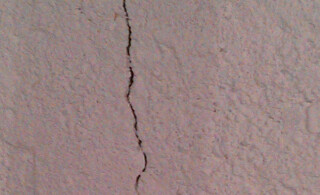 Foundation Repair: Address it NOW!
Foundation Repair: Address it NOW! 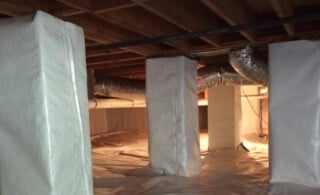 Insulating a Crawl Space
Insulating a Crawl Space 

Asphalt and concrete are the most common materials you can use if you’re looking to build a new driveway. While both are good options, each has its own set of pros and cons that are worth considering before deciding on which is better for different situations.
Happy Tuesday..Can an asphalt driveway be financed?